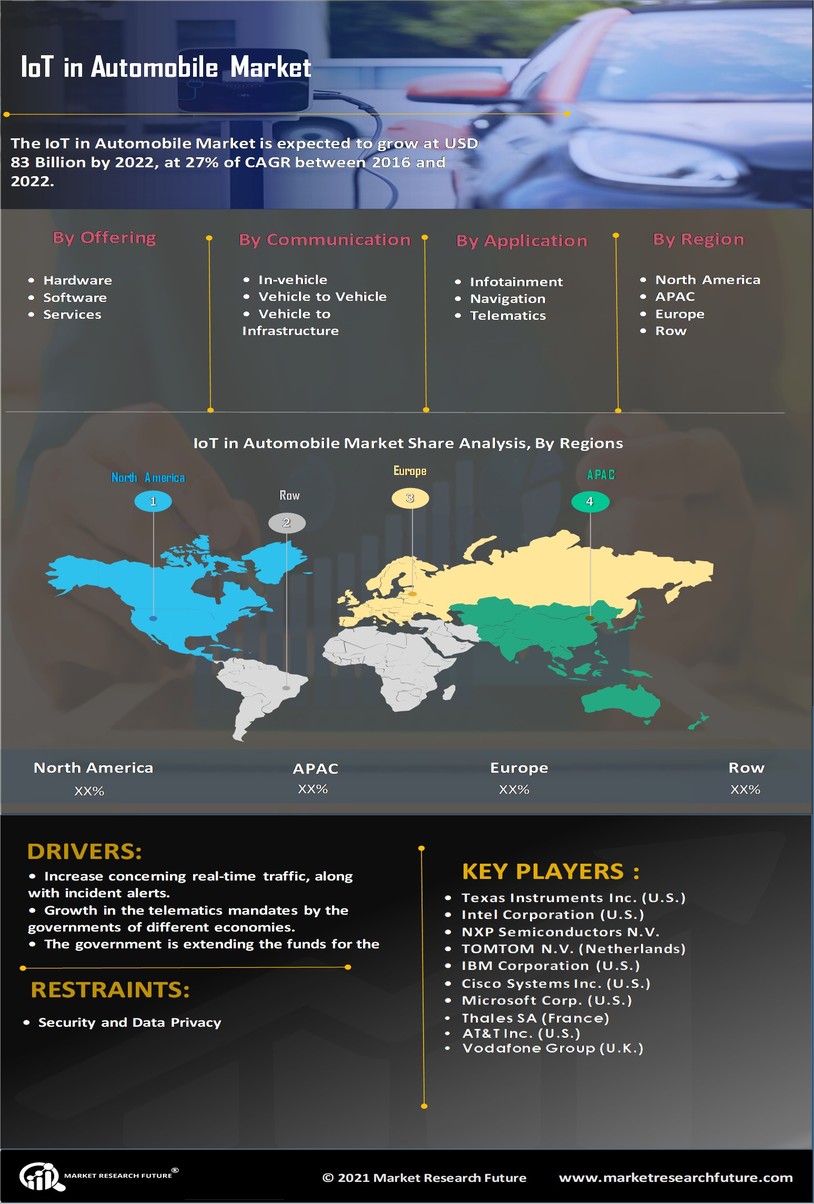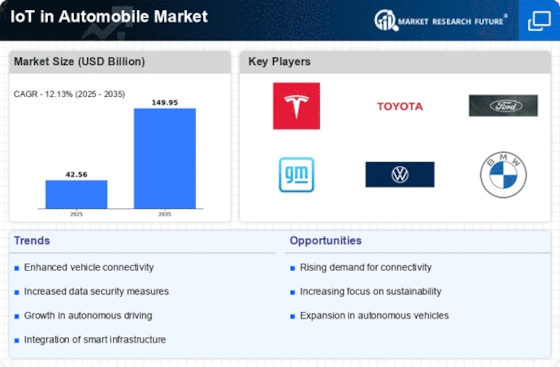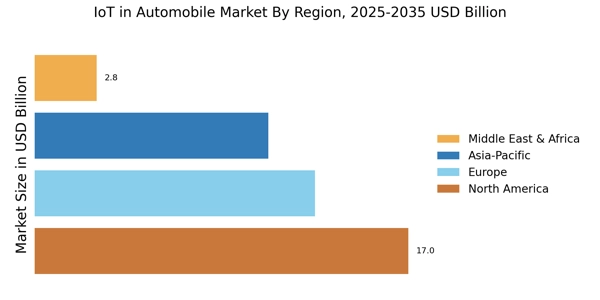Enhanced Vehicle Safety Features
The IoT in Automobile Market is increasingly driven by the demand for enhanced vehicle safety features. With the integration of IoT technologies, vehicles can now communicate with each other and with infrastructure, significantly reducing the likelihood of accidents. For instance, advanced driver-assistance systems (ADAS) utilize real-time data to alert drivers of potential hazards, thereby improving overall road safety. According to recent statistics, the implementation of IoT solutions in vehicles has the potential to reduce traffic accidents by up to 30%. This growing emphasis on safety is not only a response to consumer demand but also aligns with regulatory requirements aimed at reducing road fatalities. As a result, manufacturers are investing heavily in IoT technologies to enhance safety features, making this a pivotal driver in the IoT in Automobile Market.
Integration of Smart City Initiatives
The IoT in Automobile Market is increasingly influenced by the integration of smart city initiatives, which aim to enhance urban mobility and reduce congestion. As cities adopt IoT technologies for traffic management, vehicles equipped with IoT capabilities can communicate with traffic signals and other infrastructure. This integration allows for optimized routing and reduced travel times, contributing to a more efficient transportation system. Recent studies suggest that smart city projects could lead to a 20% reduction in traffic congestion. As urban areas continue to grow, the need for innovative solutions becomes paramount, driving the demand for IoT-enabled vehicles. Consequently, the alignment of the IoT in Automobile Market with smart city initiatives represents a significant market driver.
Consumer Demand for Connected Services
Consumer demand for connected services is a prominent driver in the IoT in Automobile Market, as individuals increasingly seek seamless integration between their vehicles and digital lifestyles. Features such as in-car entertainment, navigation, and remote vehicle management are becoming standard expectations among consumers. Market data indicates that the connected car segment is projected to reach a valuation of over 200 billion dollars by 2026. This trend is fueled by the proliferation of smartphones and the desire for constant connectivity. As automakers respond to these consumer preferences, they are investing in IoT technologies that enhance the user experience. Therefore, the growing appetite for connected services is a vital factor influencing the trajectory of the IoT in Automobile Market.
Cost Efficiency and Operational Savings
Cost efficiency is a crucial driver in the IoT in Automobile Market, as manufacturers and fleet operators seek to reduce operational expenses. IoT technologies enable real-time monitoring of vehicle performance, fuel consumption, and maintenance needs, allowing for proactive management of resources. For example, telematics systems can provide insights into driving behavior, leading to reduced fuel costs and lower insurance premiums. According to industry estimates, companies that implement IoT solutions can achieve operational savings of up to 15% annually. This financial incentive encourages widespread adoption of IoT technologies, as businesses recognize the potential for improved profitability. As a result, the focus on cost efficiency is a key factor propelling growth in the IoT in Automobile Market.
Increased Demand for Autonomous Vehicles
The IoT in Automobile Market is witnessing a surge in demand for autonomous vehicles, which rely heavily on IoT technologies for functionality. These vehicles utilize a network of sensors, cameras, and communication systems to navigate and make decisions without human intervention. Market Research Future indicates that the autonomous vehicle segment is expected to grow at a compound annual growth rate (CAGR) of over 20% in the coming years. This growth is fueled by advancements in artificial intelligence and machine learning, which enhance the capabilities of IoT systems in vehicles. As consumers become more comfortable with the idea of self-driving cars, manufacturers are compelled to invest in IoT solutions that facilitate this transition. Consequently, the push towards autonomy is a significant driver in the IoT in Automobile Market.


















